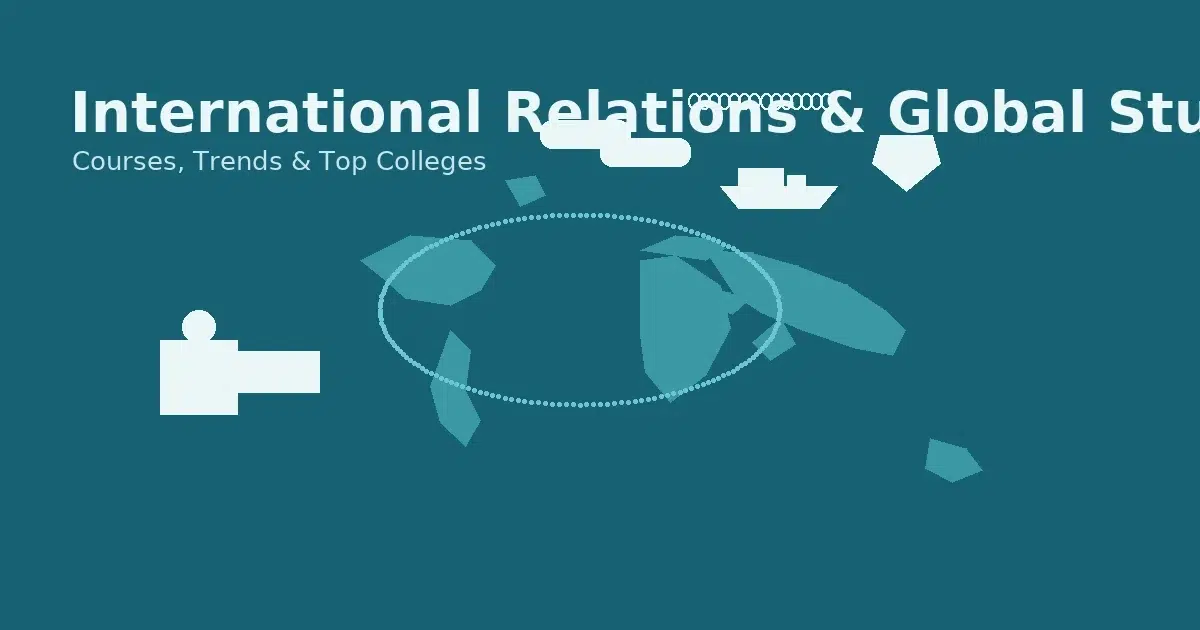International Relations & Global Studies: Courses, Latest Trends, Top Colleges (India & World) and Career Paths
3rd October, 2025
International Relations & Global Studies: Courses, Latest Trends, Top Colleges (India & World) and Career Paths
International Relations (IR) & Global Studies prepare students to understand geopolitics, foreign policy, global trade, development, and security. The field blends political science, economics, history, area studies, data, and languages—ideal for students curious about the world and keen on impact careers in diplomacy, policy, business, or the development sector. At RiteWay Career Counselling we help families choose the right programs, build profiles (language + internships), and map UG→PG→career pathways in India & abroad.
What Does IR & Global Studies Cover?
- Core themes: foreign policy, international security, global governance, international law, human rights, development & sustainability, trade & finance, migration, climate diplomacy.
- Area studies: South Asia, Indo-Pacific, Europe, Middle East & North Africa, Africa, Americas, Russia/Eurasia, China/Japan/Korea.
- Methods: qualitative & quantitative research, policy analysis, negotiation & conflict resolution, scenario planning.
- Language add-ons: French, Spanish, German, Arabic, Russian, Chinese, Japanese, Korean (plus Indian languages for fieldwork).
Degrees & FYUGP (NEP)
Under NEP’s FYUGP, students can exit after 3 years with a BA, or continue to Year-4 for a BA with Research. Popular degrees: BA (International Relations/Global Studies/Political Science + IR), BA (Hons) Economics/History with IR electives. Post-UG options include MA/MSc in IR, Public Policy, Development, Security Studies, and specialised PG Diplomas.
Admissions & Entrance Routes
- CUET UG/PG – common route for central universities (e.g., University of Delhi for Political Science/IR aligned programmes).
- JNU – School of International Studies (check yearly notice for process via CUET/own exam as applicable).
- Private universities – Ashoka, O.P. Jindal (JSIA), Shiv Nadar, Krea, FLAME, Ahmedabad Univ.: aptitude tests + SOP/interview; some accept SAT/JSAT.
- Study abroad (UG): school grades + essays/SOP; many are test-optional; English proficiency (IELTS/TOEFL) if required.
- Languages: DELF/Goethe/JLPT/TOPIK/HSK etc. strengthen applications & advanced placement.
Latest Trends in India & Globally
- Indo-Pacific focus – maritime security, supply chains, and technology alliances shape coursework and internships.
- Data-driven policy – IR programs add statistics, R/Stata, GIS, open-source intelligence (OSINT), and policy labs.
- Geo-economics – trade policy, sanctions, export controls, energy transitions, and climate finance.
- Non-state actors – think-tanks, NGOs, city diplomacy, and corporate public affairs expanding hiring.
- Languages & area expertise – dual-track profiles (IR + language) valued for research, media, and business roles.
Top Colleges in India (alphabetical – not a ranking)
- Jawaharlal Nehru University (JNU) – School of International Studies.
- University of Delhi – Political Science (IR tracks across leading colleges).
- Ashoka University – IR/Political Science, research-heavy electives.
- O.P. Jindal Global University – JSIA (Sonipat) – Global Affairs.
- Shiv Nadar University – International Relations/History/Pol-Sci blend.
- Krea University – Global Affairs within interdisciplinary BA.
- Ahmedabad University – Social Sciences with IR electives.
- FLAME University – Economics/IR/Global Studies options.
Check program structure, language offerings, study-abroad tie-ups, think-tank internships, and capstone requirements on official websites.
Top Universities Worldwide (alphabetical – not a ranking)
- Georgetown University – SFS (USA) – UG IR leader.
- Johns Hopkins SAIS (USA/Europe) – renowned for graduate IR.
- London School of Economics (LSE) (UK) – IR & International Political Economy.
- University of Oxford (UK) – PPE/IR-related tracks.
- University of Cambridge (UK) – HSPS/IR papers.
- Sciences Po (France) – IR/European & Global Affairs.
- SOAS, University of London – Asia/Africa focus & languages.
- Columbia University – SIPA (USA) – policy/IR (grad).
Skills & Tools That Stand Out
- Research & data: Stata/R, spreadsheets, basic econometrics, data visualisation, GIS, and OSINT.
- Languages: one global language (French/Spanish/German/Arabic/Russian/Chinese/Japanese/Korean) + area studies.
- Policy practice: memo writing, negotiation, simulation labs (Model UN, crisis games), field internships.
- Communication: briefing notes, media writing, public speaking; ethics & multicultural awareness.
Careers After IR & Global Studies
- Diplomacy & Govt: UPSC (IFS/IAS), policy fellowships, research wings of ministries, trade bodies.
- Think-tanks & NGOs: policy research, program management, M&E, humanitarian & development projects.
- International organisations: UN agencies, multilateral development banks, inter-governmental bodies.
- Geo-business: risk analysis, public affairs, sustainability & climate policy, corporate diplomacy.
- Media & research: international journalism, data & OSINT research, country/sector analysis.
- Higher studies: MA/MPP/IR/Dev/ Security Studies; many roles prefer/require a master’s.
Smart Choices: Tips for Parents & Students
- Build a language + area combo: e.g., IR + Arabic (MENA), IR + Chinese (East Asia), IR + French (Africa/Europe).
- Do policy internships early: think-tanks, NGOs, legislator offices, Model UN leadership, research assistantships.
- Practice evidence-based writing: policy memos, op-eds, country briefs; start a portfolio site.
- Budget & plan global opportunities: study-abroad terms, summer schools, and exchanges add strong value.
FAQs
Do I need math or economics for IR?
Not compulsory at all colleges, but economics/data courses significantly strengthen profiles for trade, development, and policy roles.
Which is better: IR or Political Science?
IR is global & externally focused; Political Science is broader (theory, Indian politics, public administration). Many programs allow a hybrid.
Is a master’s necessary?
For many policy/IGO roles yes—most mid-level positions prefer MA/MPP/IR/Dev. Strong internships + language proficiency also matter.
What languages help most?
French/Spanish for multilaterals; Arabic, Russian, Chinese, Japanese, or Korean for area expertise; combine with field experience.
Disclaimer: Lists are indicative and alphabetical (not rankings). Always check official websites for latest syllabi, entrance routes, language offerings, internships, exchanges, and scholarships.

